

It's been yet another strong year for Penn Athletics to date. The school has brought in three team league championships — with at least one more likely coming from women's lacrosse. Individuals from football, women's squash, swimming and more have dominated on the national stage. Decades-long title droughts have been broken; equally lengthy individual records have fallen. But here's DP Sports' breakdown of the best of the best in all facets of Penn sports.
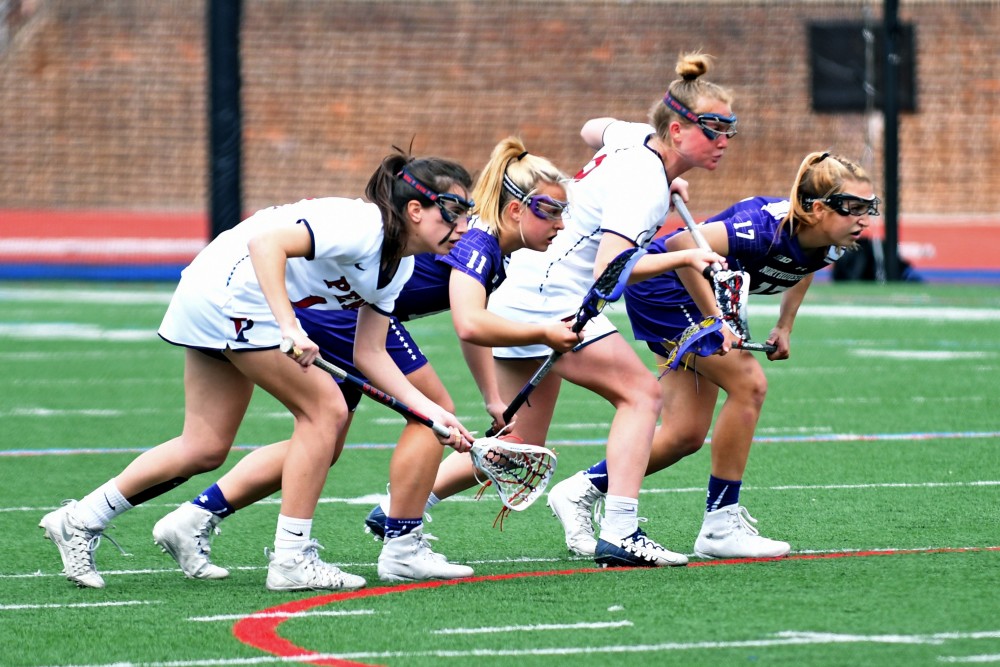
Sure, Penn men's basketball had the best story this year. But when it comes to dominance on the national stage, there's just no match for Karin Corbett's women's lacrosse program.
This team has long been a juggernaut, having won 10 of the past 11 Ivy League championships, including three NCAA Final Four appearances in that span. But just because the success has become so expected year after year doesn't make it any less impressive.
Holding a stellar 11-2 record including an unblemished 5-0 Ivy League mark, the No. 10 Quakers own quality non conference wins over schools like Johns Hopkins and Duke to match their Ivy League dominance and look well on their way to Corbett's 11th conference title.
But just as impressive as the team success have been the individuals behind it. Freshman midfielder Zoe Belodeau has put up outrageous numbers in her debut season, already 15 points ahead of Erin Brennan's previous Penn single-season rookie points record of 45.
As if that wasn't impressive enough, sophomore Gabby Rosenzweig is on pace to break a bigger school record, only 24 points shy of Nina Corcoran's single-season record of 85 with a minimum of four games remaining.
With elite star players and the team results to match, Penn women's lacrosse is the top squad of the year in Penn sports.
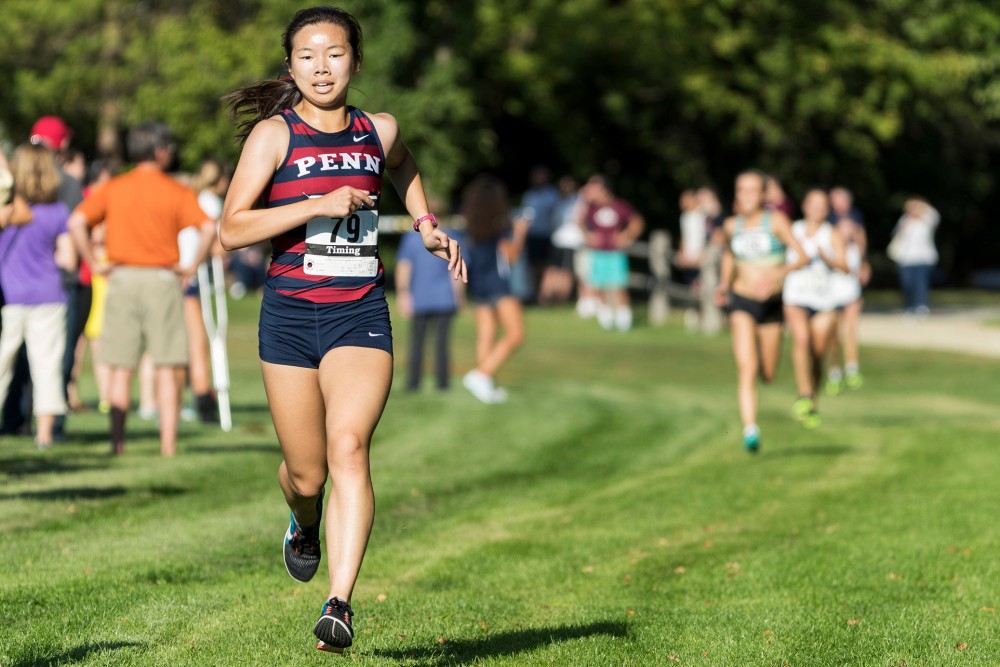
Penn women's track and field ran over the opposition at this year's Ivy League Indoor Heptagonal Championships in February, capturing the team's first Heps win since 1996. With a total of 137 points, the Quakers completely outperformed the seven other Ivy teams, beating second-place Harvard by 32 points.
The victory came both on the track and in the field events, as the Red and Blue notched six individual event wins, the most by a Penn team at the Heps since 1988. The Quakers benefited from strong performances up and down the roster, aided by both veterans and rookies.
The big winner of the weekend was superstar Abby Hong, who won both the 3000-meter and 5000m races for the Red and Blue. The senior continued her dominance in the long distance contests, setting a school record by four seconds in the latter.
For the first time since 1985, the Red and Blue won the 4x800m relay. The team of senior Gina Alm and sophomores Mikayla Schneider, Nia Akins, and Katie DeVore put up a time of 8:47.87 to outpace the competition and earn the win.
Freshman Uchechi Nwogwugwu took first in the 500m with a time of 1:13.09, good enough for fifth in program history.
In the field, Penn took first in two events for the first time in program history, with two juniors claiming the victories. Rachel Lee Wilson took first in the weight throw with a mark of 18.70m, and Anna Peyton Malizia set a new school record with her high jump height of 1.80m.
With big efforts from athletes of from years, the entire women's track and field team came together for a historic and dominant win.
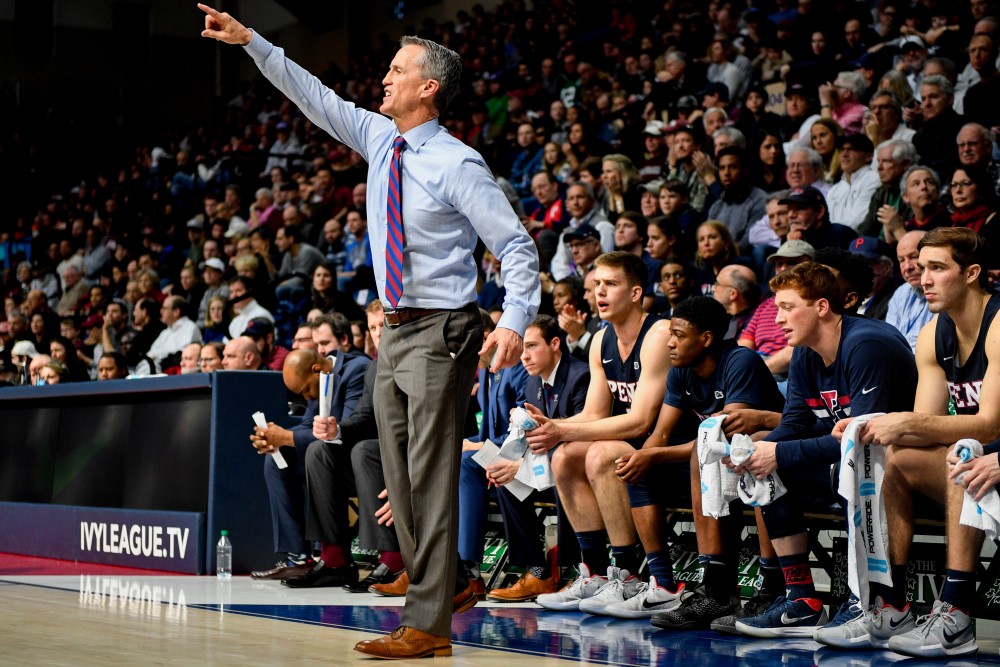
A coach usually wins an end of the year award when he or she wins a championship or vastly improves his or her team's performance.
Penn men's basketball coach Steve Donahue did both.
In just his third year, he led the Quakers to their first Ivy League championship since 2007 after fourth and fifth-place finishes over the last two seasons. In fact, since its 0-6 start in Ivy play last year, Penn has won 18 of 23 Ivy League games.
However, it is not just the improvement in overall record that speaks to why Donahue deserves "Best Coach." He is also a master at manipulating the rotation. While the starting lineup remained the same, Donahue often experimented with whom he brought off the bench.
In many games, unexpected contributors propelled Penn to victory. Whether it was senior Sam Jones' 15 point outburst against Dayton, junior Jake Silpe's timely threes at Dartmouth, or sophomore Devon Goodman's 23 points at Columbia, Donahue was never afraid to give seldom used players big minutes when they earned it. Constantly changing the rotation allowed Donahue to find the perfect bench combination come tournament time.
By the end of the year, Penn arguably had the most talented bench in the Ivy League. Goodman and sharp-shooting senior Caleb Wood consistently provided instant offense and were instrumental throughout Penn's run to the NCAA tournament.
Furthermore, he also led the Quakers' resurgence largely without a freshman class. Guards Jelani Williams, a projected starter, and Eddie Scott missed most of the season with injuries while forward Jarrod Simmons fell out of the rotation.
Donahue may not be the only Penn coach to win an Ivy League championship this year, but none was more responsible to his team's success than the reigning Ivy League Coach of the Year.
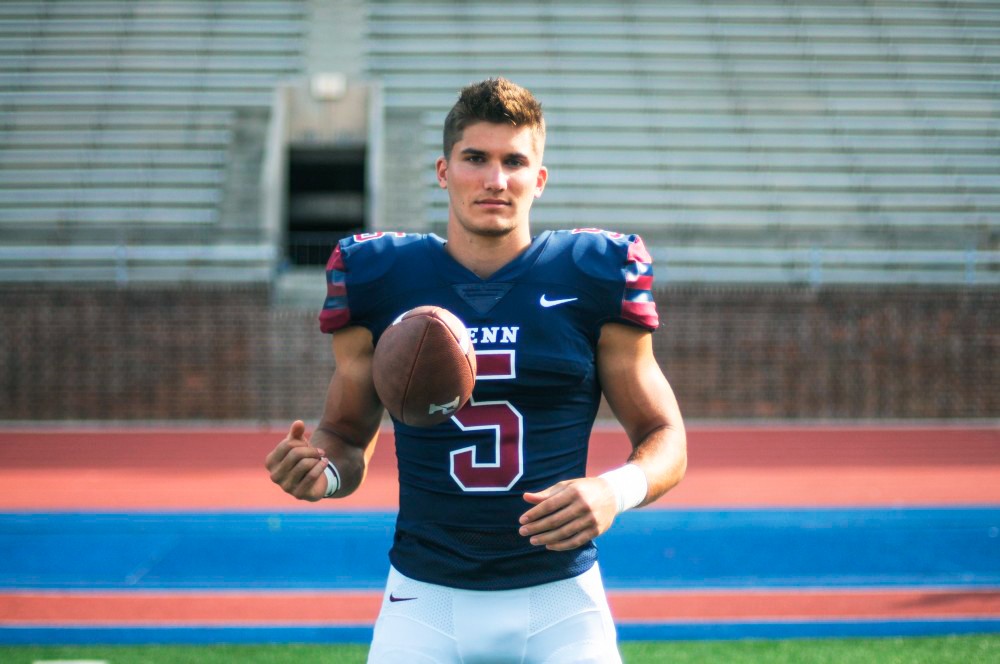
Justin Watson might just be Penn's best athlete of all time.
Watson's 2016 campaign was historic. He broke Penn's records for single-season receptions and receiving yards, while also leading the Ivy League in receiving touchdowns, receiving yards, and yards per game. For his efforts, he was named the runner-up for Ivy League Offensive Player of the Year for the second time.
So how could he follow that up in his final season, especially after losing his quarterback to the NFL?
By putting in arguably his best season yet.
Watson set the program-record for single-season receiving TDs with 14, hauling in at least one score in all 10 of Penn's games. He ripped off six games of 100+ receiving yards, capped by a 192-yard performance in his final game against Cornell. He accounted for over half of Penn's receiving yards and two-thirds of its receiving TDs. He led the Ivy League in yards per catch, receiving touchdowns, and finished second in receptions and yards.
And he did all of this while breaking a bevy of all-time Penn and Ivy records. He now owns the triple crown of Penn receiving records (career receptions, receiving yards, and receiving TDs), he became the first Ivy player to catch a pass in all 40 of his career games, and the first to catch a touchdown in every game in a season.
Watson leaves Penn as its most decorated receiver ever, with a legitimate chance of being taken in the NFL Draft. He's been Penn's ultimate weapon for the past four years, and this year, he was at his most lethal.
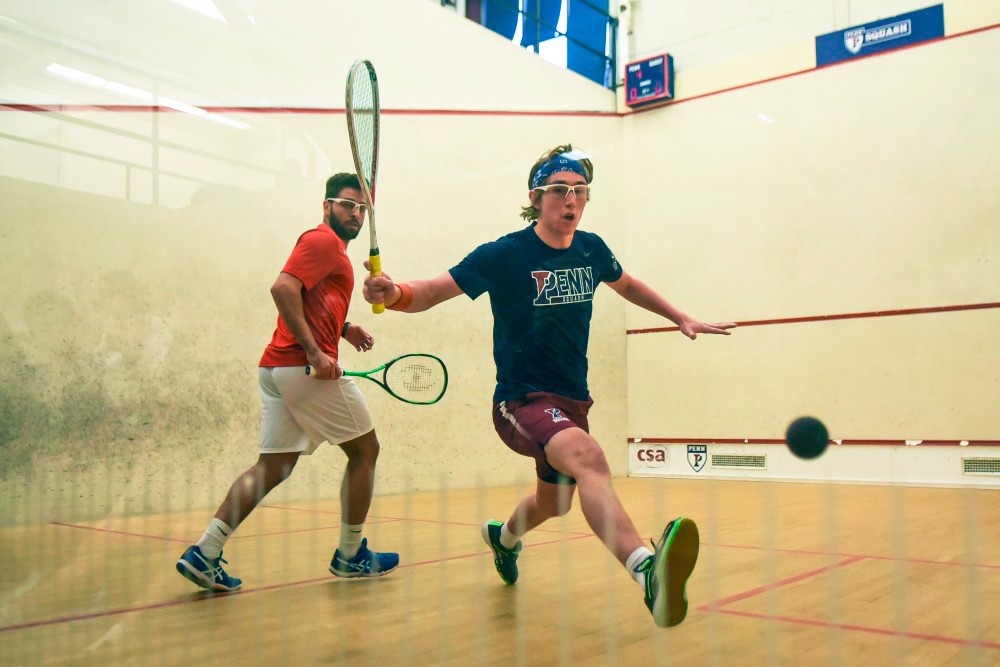
Freshmen usually aren't expected to contribute much on the court, let alone be the best player on the team and one of the best in the whole Ivy League.
But that's exactly what Andrew Douglas did this year in his first season with Penn men's squash.
After finishing the season with a 14-6 record in the No. 1 slot, including a 5-2 record in the Ivy League, Douglas earned every honor that was available — and there were plenty. Not only was he named first-team All-Ivy and first-team All-American after qualifying for the CSA Individual Tournament, but according to his coach Gilly Lane, "he has the opportunity to be the best American player ever."
The freshman from Brooklyn, NY lost his two matches at the CSA Tournament, but he went up against stiff competition in facing Harvard senior David Ryan and St. Lawrence sophomore Karim Ibrahim. Douglas is already playing at the level of most upperclassmen, and he will surely be a force at the CSA Tournament for years to come.
On the season, Douglas led the Red and Blue to an 11-7 record and a 4-3 mark in conference play. The team finished ranked seventh in the national Dunlop College Squash Rankings as part of another solid season.
The Quakers haven't won an Ivy championship in over 40 years, but with Douglas leading the way for next the three years, the future looks bright in University City.
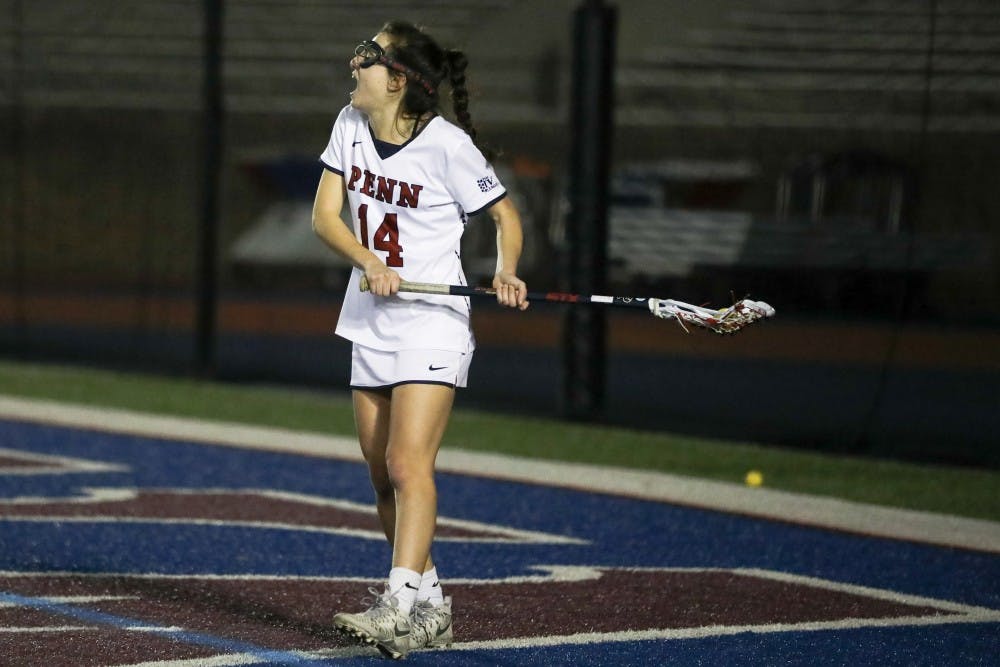
You know you're having a good season when the conversation includes things like "of all time," or "program history." That is exactly what has happened for freshman attack Zoe Belodeau.
Belodeau obliterated the Penn women's lacrosse freshman points and assists records earlier this season, and her totals keep climbing. Even with two games left in the regular season and more in the postseason, her 60 points put her in the top 10 most prolific seasons in program history — 15 ahead of Erin Brennan's previously standing school freshman record. She has already been named a women's lacrosse National Player of the Week by the Baltimore Sun and has been Inside Lacrosse's Rookie of the Week once, earning two third-place votes for that distinction as well.
Within the Ivy League, Belodeau leads the conference in assists per game and is in the top five for points per game. She has earned two Ivy Offensive Player of the Week nods, and is on the Tewaaraton Award Watch list, which is given to the best women's lacrosse player in the nation.
Belodeau is the best freshman on one of Penn's most nationally competitive teams. She is a lock for All-Ivy recognition in her first season, making her a good choice for Female Rookie of the Year.
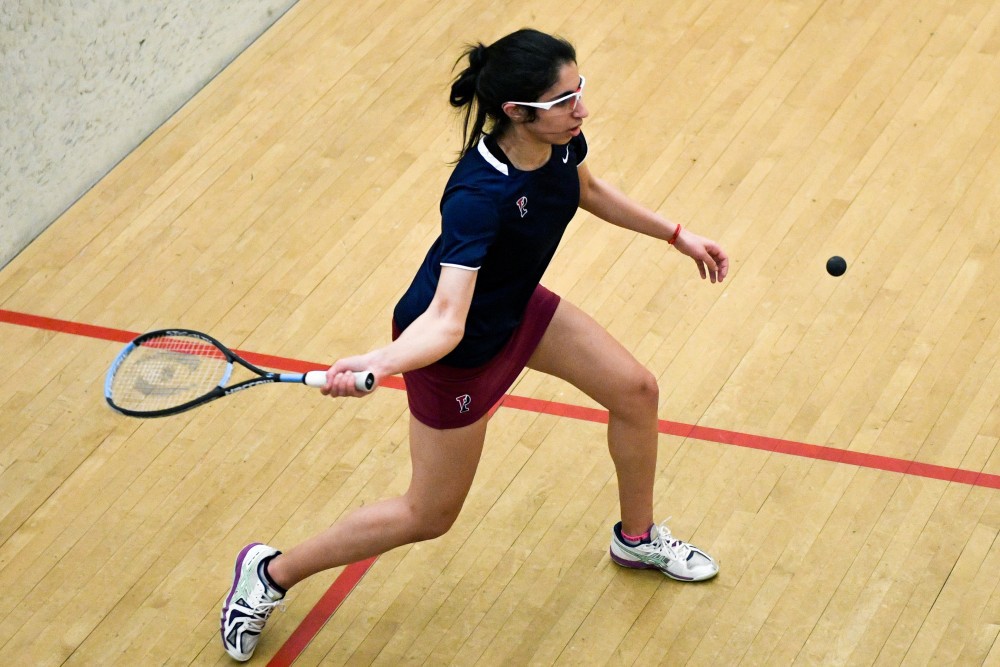
It's not every year that Penn Athletics produces a national champion. But junior Reeham Sedky of women's squash became the program's first individual to top the nation since 1996 when she won the 2018 CSA Individual National Championship in March.
Sedky, who had reached the final in both 2016 and 2017 as well, finally took the crown by defeating Harvard's Gina Kennedy in a convincing four-game triumph. She dropped just two games all season long, winning each of her 20 matches against collegiate opponents.
After the college season ended, however, Sedky continued on to play two tournaments on the professional circuit. In her first professional appearance, she went on to beat the tournament's top seed and world No. 20 in the first round, advancing all the way to the finals of the Texas Open and falling to world No. 16 Amanda Sobhy in the championship.
Just two weeks later, ‘The Hammer' traveled to Richmond for her second pro tournament. She marched straight to the finals to take on world No. 31 Rowan El Araby for the title. Sedky beat El Araby in four games to win her first professional championship and shoot up 150 places in the world rankings.
It was undoubtedly the best season yet for Sedky, already a recipient of the 2016 US Olympic Committee's Athlete of the Year. With one season left in her collegiate career, she has already won everything in the game except a team title. Regardless of result in 2019, Sedky will enjoy having reached the peak of Penn Athletics this spring.
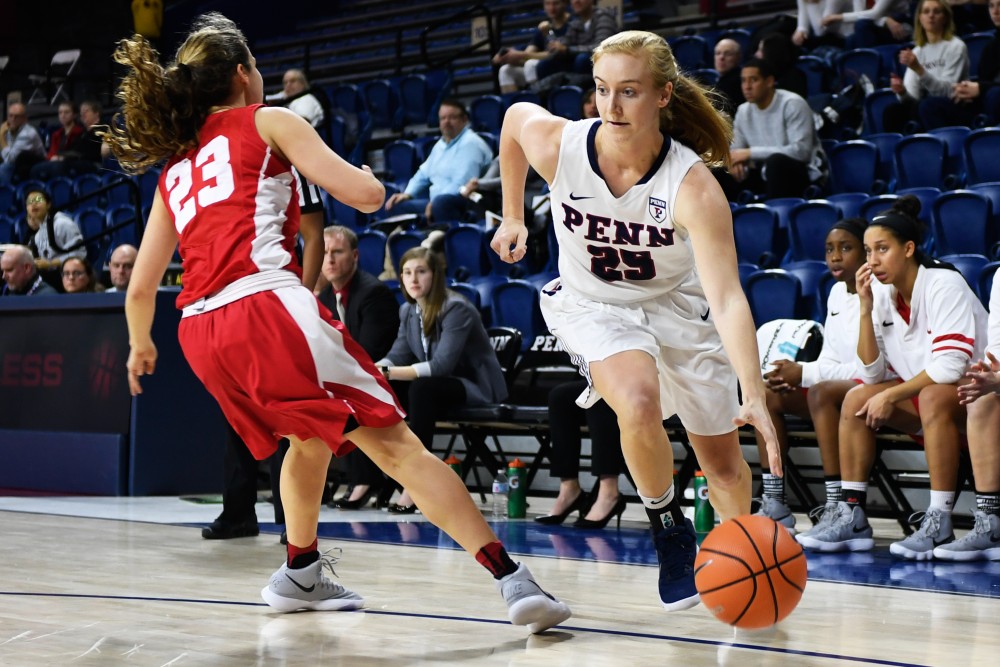
There comes a time when putting your body in harm's way on a regular basis pays off, and this was the season that such behavior did for junior guard Ashley Russell.
In her sophomore year, Russell was regarded as a key role player coming off the bench for the Quakers who demonstrated hustle like no other. But in her junior season, where Russell started 29 out of 30 games for Penn, she regularly contributed to each game's outcome while still frequently hitting the hardwood.
Despite being a guard, Russell regularly pulled down offensive boards using her aggressive style, averaging almost two per game. She also racked up the second-most steals on her team, boasting yet another stat displaying her all-out style.
Her most memorable performance of the year had to be away against city-rival Temple where she set a career high in rebounds with nine and points with 19 – which she later broke again with 21 at Dartmouth – along with four assists. Russell also lit it up from behind the arc, splashing home three treys. Her stellar performance allowed Penn to claim the Philadelphia Big 5 championship this season.
A final, embodying stat of Russell's was the seven chairs she managed to knock over while diving for a loose ball during the Quakers' game against Villanova. The guard certainly doesn't know how to give up, and for this reason, she's earned the honor of Best Female Breakthrough Athlete.
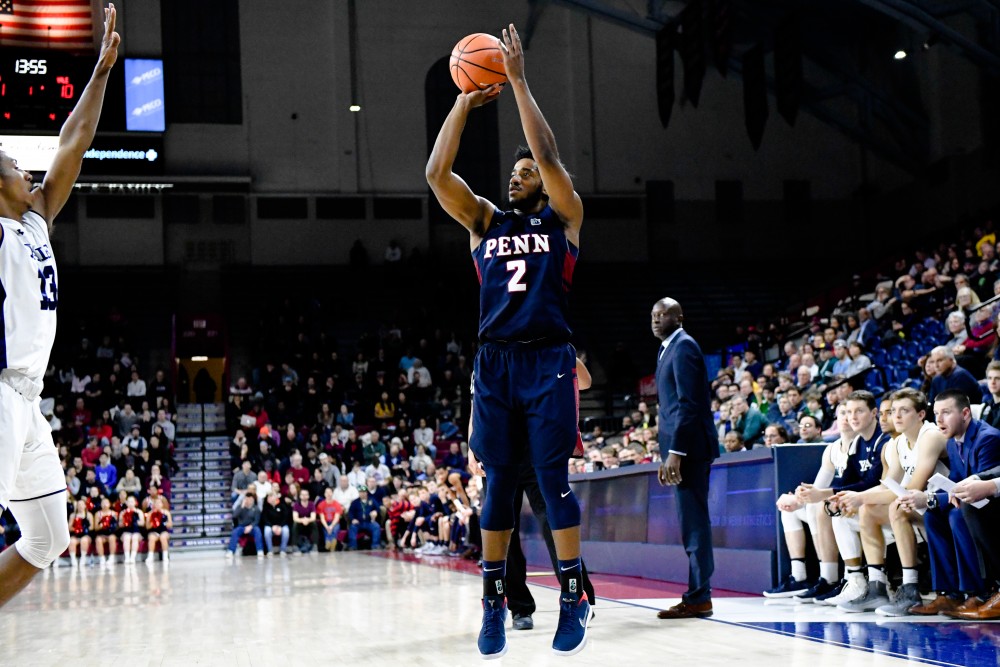
There was a lot more to Antonio Woods' comeback than just basketball. In January 2016, Woods found himself in an unenviable position. Not only was he ruled ineligible for the remaining games in the 2015-16 season, but he was also disqualified from the first half of the following season and temporarily suspended from the University itself for academic ineligibility.
After an impressive freshman season, during which Woods led the team in assists and minutes, things were looking up for the then-sophomore and the program itself, following the addition of Steve Donahue as head coach. But then, Woods found himself on the outside looking in, as the 2015-16 team went on to suffer a losing streak that extended from the end of one season into the start of another without his electric scoring and playmaking.
Woods dedicated his time to working late nights at Temple University Hospital, transporting patients and volunteering with the Philadelphia Youth Basketball Association. Forced to take a year off from school and basketball and live on his own, Woods took everything in stride, working on his game and acting as an informal assistant coach for the team.
And it showed.
Coming back into the 2017-18 season, it wasn't clear what Woods' role would be. With strong freshman seasons from AJ Brodeur, Ryan Betley, and Devon Goodman, there was reason for concern. But Woods earned his way back onto the court, starting 32 of 33 games, and didn't waste a single minute.
Sharing ball-handling responsibilities with senior star Darnell Foreman, Woods averaged 7.7 points and 3.6 rebounds per game, while also providing elite defense on other team's star players - even ones as big as Harvard power forward Seth Towns - and crucial leadership on a talented but young team.
By all accounts, Woods isn't just a better basketball player; he's embraced the lessons he learned during his suspension and is a grateful, wiser player with a broader perspective on life and basketball. The way he's risen above unfortunate circumstances and improved himself and his team is laudable. And that's why he's our Comeback Player of the Year.
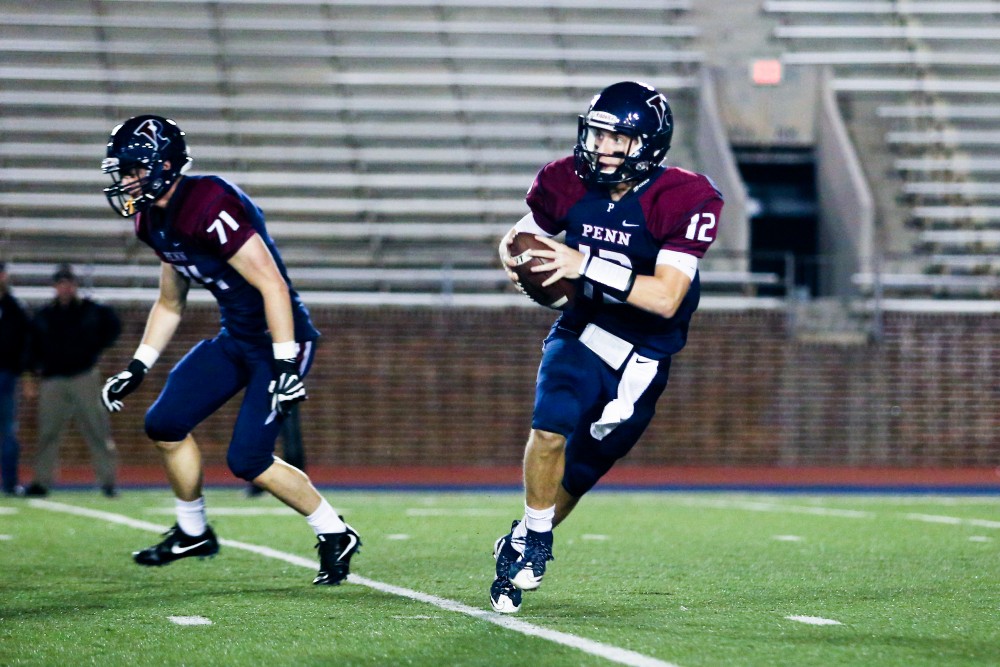
Entering the 2017 season, Penn sprint football faced a big question.
How would the Quakers replace the best player in program history?
During the previous four years, Mike McCurdy was the man in charge under center, but after his graduation, an obvious void had formed. The Quakers were coming off of a perfect 7-0 season, in which they won the Collegiate Sprint Football League (CSFL) Championship and McCurdy took home his second league MVP award.
So, in stepped sophomore Eddie Jenkins, who appeared briefly in two games in the 2016 season. Jenkins wasted no time in proving that he was more than ready to take the reins from McCurdy. The sophomore from Pittsburgh started the 2017 season with a superb performance in a 69-6 win at Caldwell, passing for 191 yards and three touchdowns, while adding 91 yards and a touchdown on the ground.
He continued to play at this level through the rest of the year, finishing with 1424 passing yards, 11 touchdowns, and just four interceptions. Jenkins also managed to keep defenses on their heels with his ability to tuck the football and run. He was second on the team in both rushing yards (265) and rushing touchdowns (6). He averaged 241.3 total yards of offense per game, more than 60 yards ahead of any other player in the league.
Along with his pure talent, Jenkins' poise and leadership on the gridiron was a central reason why the Red and Blue played in the inaugural CSFL Championship against Army. Even though they lost in that one, the Quakers and Jenkins put together a season to remember, finishing 6-2 on the year.
With Jenkins remaining at the helm, it's hard to imagine Penn not competing for more CSFL Championships in the next couple of years.
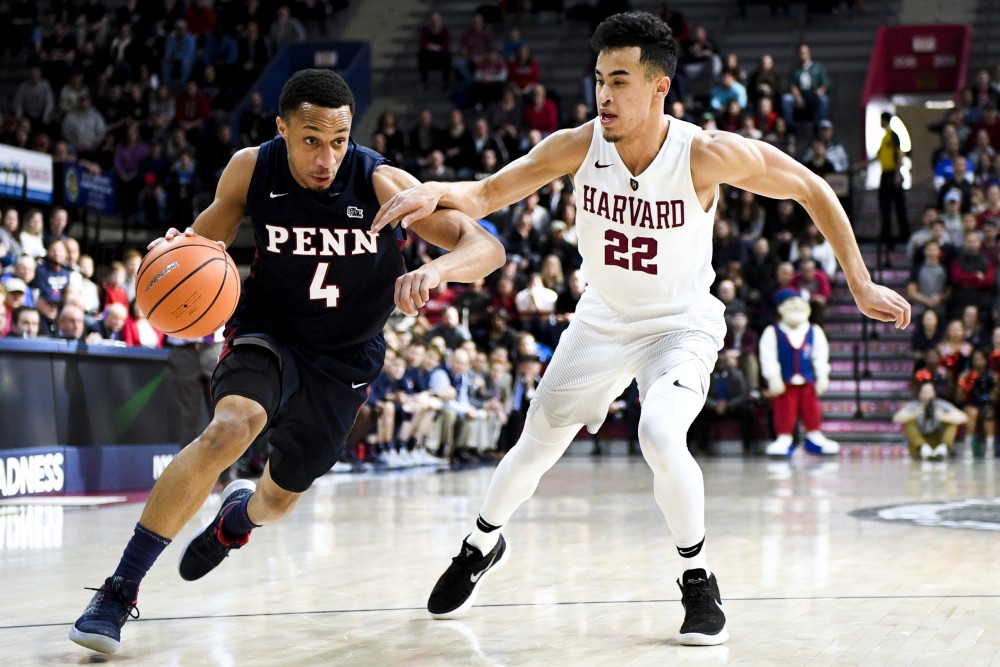
Icon.
That's what senior guard Darnell Foreman became after his performance in the Ivy League Tournament.
Against Yale, Foreman's game was efficiency and defense. He shot 80 percent from the floor for 11 points, grabbed eight rebounds, and helped shut down the Elis guards in the dominant win.
But the real magic came against Harvard in the final. Foreman took over late in the first half, scoring 19 points and missing just one shot. His hot shooting spurred Penn's 24-0 run that would put the Quakers back in the game after trailing by double-digits in the first half.
The iconic moment came in the waning seconds in that half, where a double-teamed Foreman nailed a deep three at the buzzer and ran directly down the court to the locker room. Great performances often come with a memorable highlight, and Foreman supplied a huge one on that play.
Foreman's first half forced a defensive adjustment from the Crimson, and with top defender Justin Bassey following Foreman around in the second 20 minutes, the floor opened up for the rest of the dangerous Penn offense; AJ Brodeur, Ryan Betley, and Caleb Wood all had great halves.
Foreman's performance made it all possible. He supplied the grit, emotion, and spark the Quakers needed to beat Harvard in what was the Best Individual Championship Performance all year long.
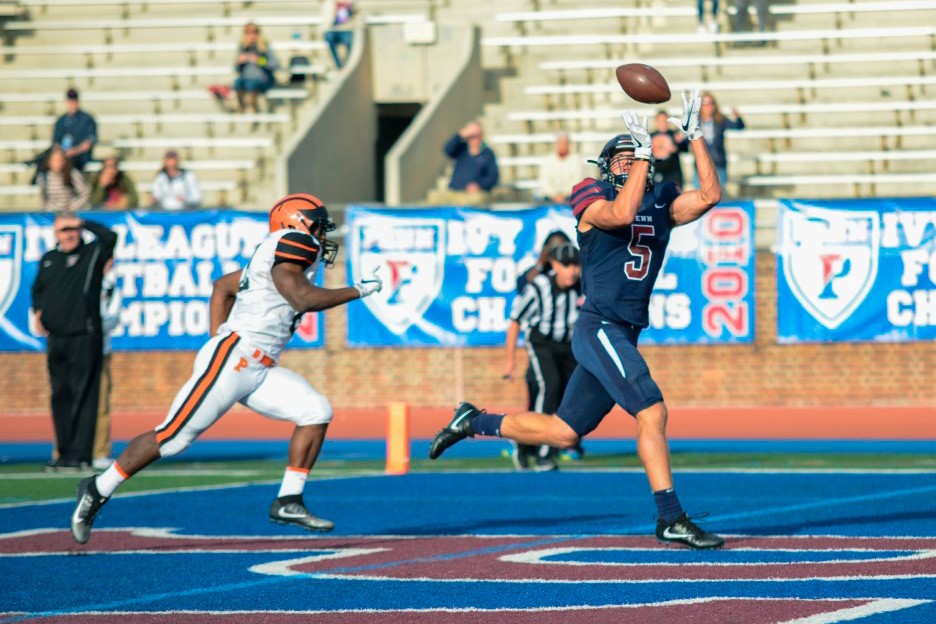
The question isn't, "who was the most impressive record-breaker in Penn sports?" Rather, it's "which one of Justin Watson's records was best?"
Let's look at the school records first. There are the all-time Penn marks for single-season receiving TDs (14), career receptions (286), career receiving yards (3,777), career receiving TDs (33), and career all-purpose yards (4,116). The only player in Ivy League history with more career receiving yards than Watson is 1990s Brown star Sean Morey, who won a Super Bowl and made a Pro Bowl at the professional level.
Then one can get into the all-time Ivy League records. For instance, Watson beat out Morey for the most career receiving yards in Ivy play (2,675). And Watson is also the only player in the conference's history to secure at least one catch in all 40 of his career games.
But the one we find most impressive? This season, Watson became the only player in Ivy League history to catch a touchdown pass in every single game — that's right, 10 straight games with at least one score, no matter who the opposition was.
Opposing teams didn't know quite how Watson would beat them, whether it would be his speed, size, athleticism, or skill that would allow him to shred their defense to pieces. The only certainty was that he would be absolutely unstoppable for Penn football. And after the senior has racked up all kinds of awards in his historic career, he has one more to tack on before graduation rolls around — our Best Record-Breaking Performance.
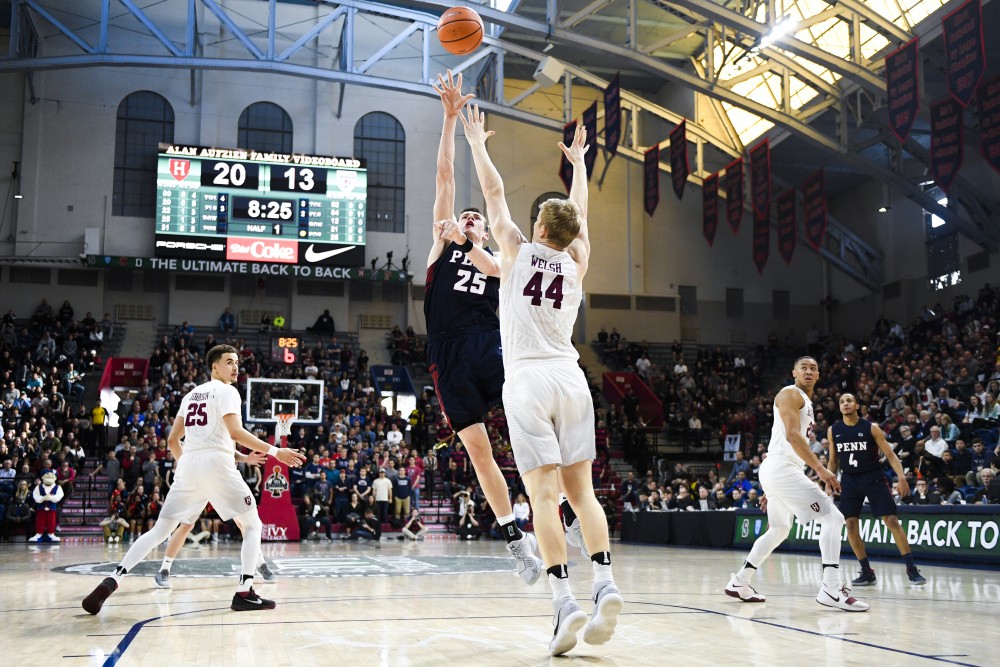
Was there even a question that this game wouldn't win this award? With all due respect to a few other games that were amazing in their own rights (field hockey vs. Syracuse, men's lacrosse vs. Duke), this was the biggest game in Penn Athletics in at least the past five years.
In front of a boisterous Palestra crowd that undoubtedly gave the Quakers a boost, Penn and Harvard played an all-timer, with so many different incredible moments. It was back-and-forth the whole way, with the game coming down to the final seconds.
Early on, it was the Darnell Foreman show for the Quakers. He scored 11 of Penn's first 13 points, and kept the Red and Blue in the game when the offense was stagnant. But after a 13-0 run by the Crimson, Penn was in a big hole.
That's when the shots started falling.
From 3:02 remaining in the first to 16:35 left in the second, Penn went on a 24-0 run to take a double-digit lead. Each bucket sent the crowd further and further into a frenzy, but no shot more so than Foreman's incredible three before the half that will live forever on the walls of the Cathedral of Basketball.
But Harvard wasn't done yet. After matching Penn for much of the second half, the Crimson busted out another 13-0 run in just a two-minute span to regain the lead, 58-55, with a little more than five minutes left.
Enter Caleb Wood. The senior sharpshooter scored Penn's next eight points, including the game-tying and go-ahead threes, to put the Red and Blue ahead for good. After four minutes of lockdown defense and a few clutch free throws from Ryan Betley, it was over: Penn had reached the NCAA Tournament for the first time in 11 years.
For a tournament branded as Ivy Madness, this game more than lived up to the hype.
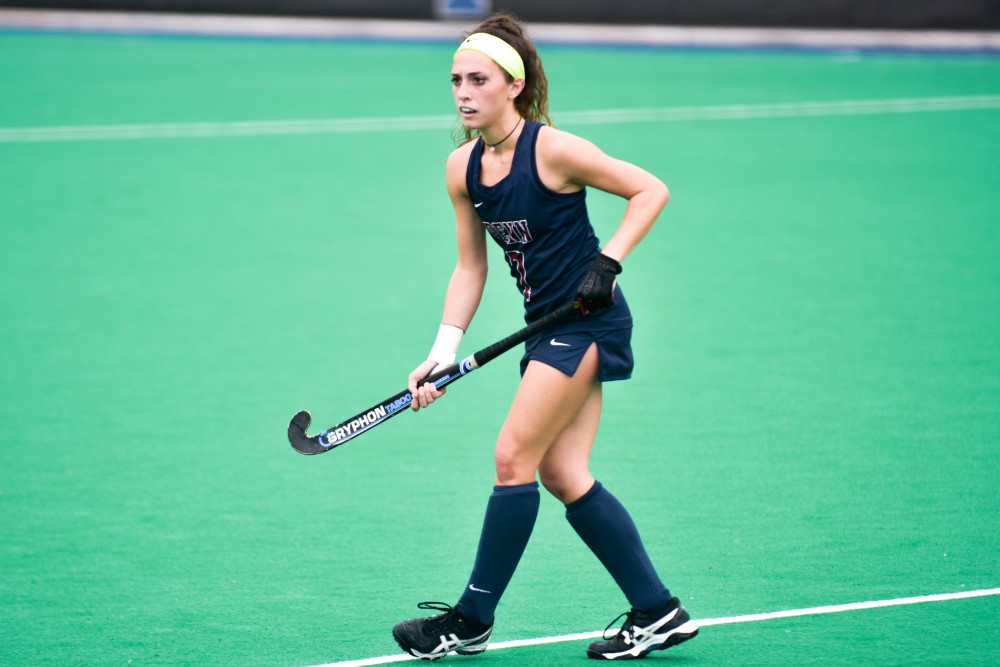
The list of accolades in senior Alexa Hoover's career with Penn field hockey is almost endless. But what happened with six minutes left against Syracuse this fall, even for her standards, was ridiculous.
A year after falling 4-0 to the Orange, unranked Penn was hanging with No. 10 Syracuse on its home field, with plenty of help from Hoover, of course, who had two assists to classmate Gina Guccione in what was a 2-2 game.
But just after Penn had a different potential game-winning goal negated, Hoover turned the Quakers' dreams of an upset into reality.
Stealing an errant Syracuse pass, and then impeccably bobbling the ball on her stick for roughly five yards, Hoover proceeded to volley an absolute rocket into the top left corner.
Syracuse freshman goalie Borg van der Velde had no chance at all. As soon as the ball hit the net, Hoover threw her stick into the Ellen Vagelos Field turf — a celebration that cost her a penalty, but perhaps the most worthwhile flag of her career.
Six minutes later, Penn's first top-10 win of coach Colleen Fink's career was complete. Days later, the shot had already been shared by FOX29 and the NCAA's website. And months later, the shot heard 'round the field hockey world goes down as our Best Play of the year.
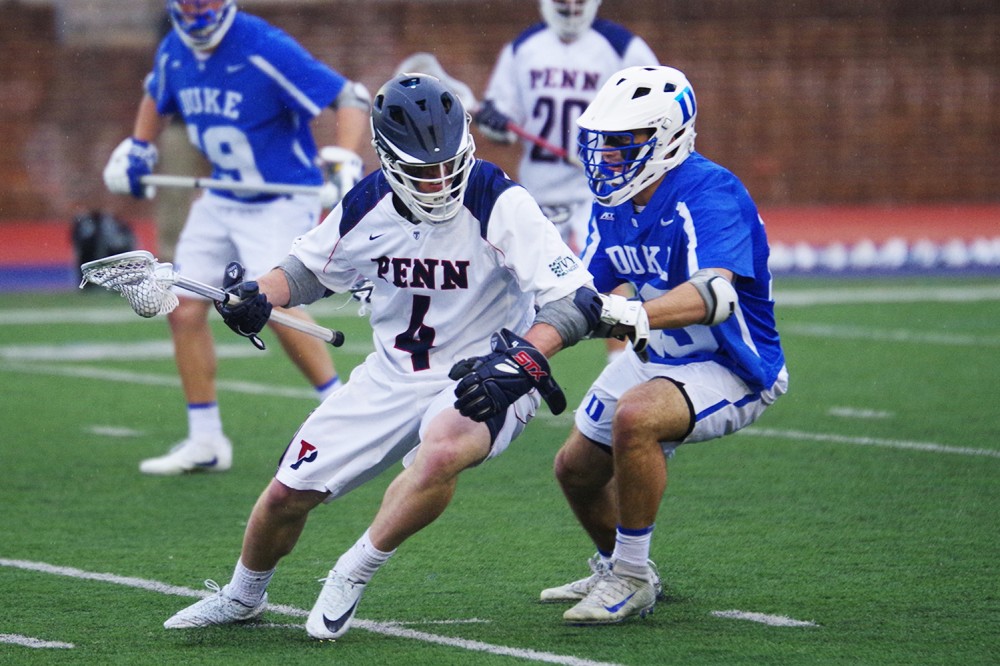
This one's easy. In fact, it's been set in stone since February.
In a dramatic, come-from-behind effort, Penn men's lacrosse defeated perennial power and then-No. 1 Duke to earn the Upset of the Year.
At home, in front of a sizeable Franklin Field crowd, the Quakers played arguably their best lacrosse of the season. Yet, for most of the contest, it simply wasn't enough. Duke seemed too skilled, too deep, and too disciplined. Whenever the Red and Blue would score and grab an ounce of momentum, the Blue Devils would respond, snatching that momentum right back.
But something changed in the fourth quarter.
Chris Santangelo started to dominate the faceoff, stars Kevin McGeary and Simon Mathias buried their opportunities, Reed Junkin was stout in the cage, and Penn's defense delivered its most complete performance of the season.
With their collective backs against the wall, the Quakers played like they had nothing to lose and everything to gain, and, considering their opponent was one of the most dominant lacrosse programs of the decade, that was the correct mindset.
Scoring the game's final four goals en route to a 10-9 victory, the Red and Blue announced themselves to the lacrosse world.
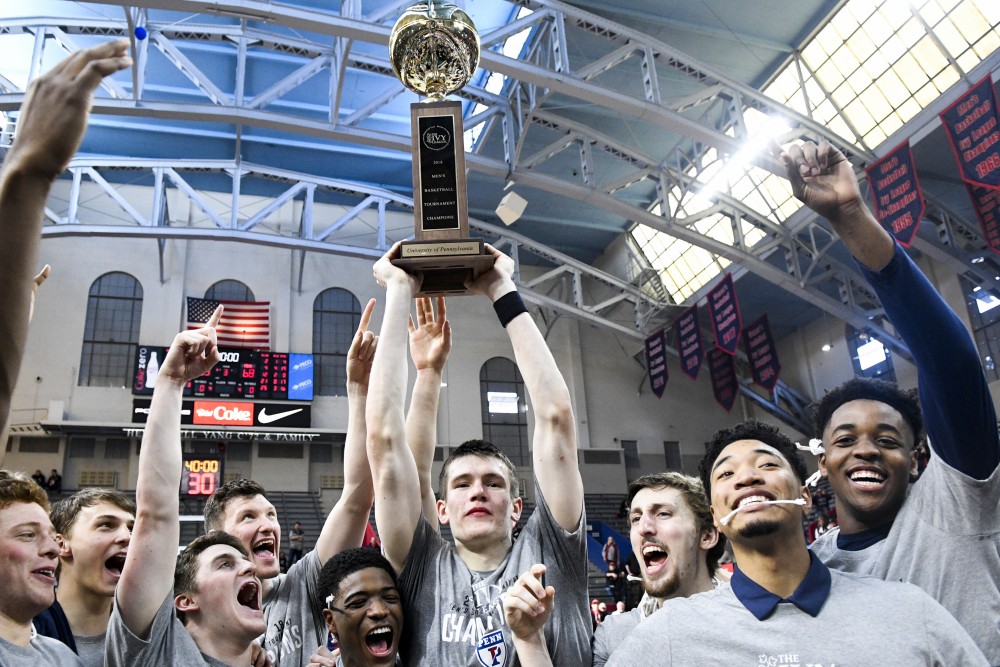
It's pretty exciting whenever a team wins a do-or-die game to make March Madness. It's even more exciting when a team does it for the first time in 11 years.
But for a team to do that on its own home court in front of its raucous student body? It doesn't get much better than that — and that's exactly what happened when Penn men's basketball beat Harvard in the Ivy League Tournament championship this year.
The game itself was phenomenal, but the celebration after was perhaps even better. Within seconds of the final buzzer going off, hundreds of students had swarmed the team at half-court as the loudspeakers blasted DJ Khaled's "All I Do Is Win."
Eventually, the players and coaches made their way to one of the baskets and cut down the net; but it turned out that even after the net had been completely cut down, the party was only just getting started.
In a fitting blast from the past, senior captain Darnell Foreman hoisted himself up so that he was sitting on top of the rim as the crowd below him erupted into applause. It was the last game of Foreman's career at the Palestra, and he truly got to go out on top.